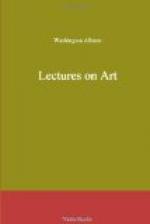But the wisdom of the law in question is not merely that it is a preventive to the mind preying on itself; we see in it a higher purpose,—no less than what involves the developement of the human being; and, if we look to its final bearing, it is of the deepest import. It might seem at first a paradox, that, the natural condition of the mind being averse to inactivity, it should still have so strong a desire for rest; but a little reflection will show that this involves no real contradiction. The mind only mistakes the name of its object, neither rest nor action being its real aim; for in a state of rest it desires action, and in a state of action, rest. Now all action supposes a purpose, which purpose can consist of but one of two things; either the attainment of some immediate object as its completion, or the causing of one or more future acts, that shall follow as a consequence. But whether the action terminates in an immediate object, or serves as the procreating cause of an indefinite series of acts, it must have some ultimate object in which it ends,—or is to end. Even supposing such a series of acts to be continued through a whole life, and yet remain incomplete, it would not alter the case. It is well known that many such series have employed the minds of mathematicians and astronomers to their last hour; nay, that those acts have been taken up by others, and continued through successive generations: still, whether the point be arrived at or no, there must have been an end in contemplation. Now no one can believe that, in similar cases, any man would voluntarily devote all his days to the adding link after link to an endless chain, for the mere pleasure of labor. It is true he may be aware of the wholesomeness of such labor as one of the means of cheerfulness; but, if he have no further aim, his being aware of this result makes an equable flow of spirits a positive




